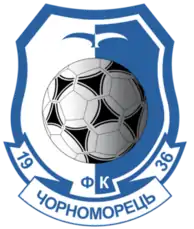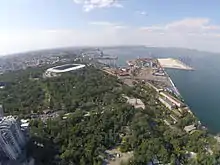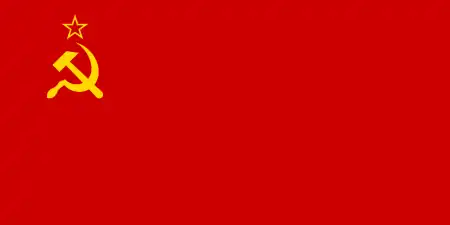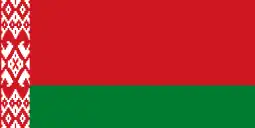 | |||
| Full name | Футбольний Клуб «Чорномо́рець» Одеса Football Club Chornomorets Odesa[1] | ||
|---|---|---|---|
| Nickname(s) | Моряки (The Sailors) | ||
| Short name | FCCO | ||
| Founded | 26 March 1936 | ||
| Ground | Chornomorets Stadium | ||
| Capacity | 34,164 | ||
| Owner | Vertex United | ||
| General Director | Anatoliy Misiura[2][3][4] | ||
| Head coach | Roman Hryhorchuk | ||
| League | Ukrainian Premier League | ||
| 2022–23 | Ukrainian Premier League, 10th of 16 | ||
| Website | Club website | ||
|
| |||
FC Chornomorets Odesa (Ukrainian: Футбо́льний Клуб Чорномо́рець Оде́са [tʃornoˈmɔretsʲ oˈdɛsɐ]) is a Ukrainian professional football club based in Odesa.
The club's home ground is the 34,164 capacity Chornomorets Stadium opened in 1935 and rebuilt in 2011. According to the club's website, it was formed in 1936 as Dynamo,[5] but until 2002 it carried a logo with 1958 and 1959[6][7] years of foundation on its shield when the club received its current name. Moreover, the club's shield is very similar to the shield of Romanian FC Farul Constanța.[8]
For over 30 years, the club was sponsored by the Black Sea Shipping Company (1959–1991).[9] The club was among top 20 Soviet clubs that competed in Soviet Top League.
History
Black Sea (pre-history)
At the beginning of the 20th century, in Odesa, within limits of Alexander Park (today Shevchenko Park), a construction started of what was supposed to become a pond. However, after the pit for the pond was dug out, the funding stopped and so did the construction. Soon the hole began to serve as a field for one of city's non-league teams. As the hole resembled a shape of the Black Sea, that was the nickname given to the field, and the team was named "Чорне море" Chorne more. And although that team is unrelated to the today's club, it was the first team in Odesa to play under that name.
History of name
Dynamo and previous names
The official date of foundation of Chornomorets Odesa is considered to be 26 March 1936 as Dynamo Odesa. Dynamo Odesa, however, participated before that in the city championship since 1923 (the year of establishment of the Ukrainian football competitions)[7] winning it in 1933. Dynamo Odesa itself was first called Spartak Odesa until 1926.[7] In 1940, after relegating from the Top level, the club was merged with Kharchovyk Odesa that participated in the republican competitions (Championship of Ukrainian SSR) and replaced Dynamo in next competitions.[7][10] In 1941, the club was reformed again when it was included into the War Championship (Top division) under the name of Spartak Odesa.[10]
Concurrently in league competitions of the Ukrainian SSR, since 1936 in Odesa played another team Kharchovyk Odesa.
Until Chornomorets Odesa was bought out by Leonid Klimov sometime in 2001, the club's foundation was considered to be 1958.[7]
Post WWII and Kharchovyk/Pischevik
After World War II the club was reestablished as Kharchovyk Odesa in the lower Soviet division (Class B).[10] In 1950, the club lost its place in the play-offs to Spartak Uzhhorod (Zakarpattia Uzhhorod) and was dissolved. In 1953, upon the enlargement of the "Class B" competitions (Second division), the city of Odesa was represented by Metalurh (in Class B 1953, 1954) which soon was replaced again with already more familiar Kharchovyk Odesa.[10] In 1957–58, there was established Avanhard sports society which adopted number of other smaller societies in Ukraine under its umbrella.[10] In 1958, the Odesa city team adopted the name Chornomorets and represented the city's Rope Factory.[10]
Chornomorets (Black Sea Shipping Company)
In 1959, Chornomorets was handed over to the Black Sea Shipping Company which was a member of Vodnik sports society. Since then its emblem corresponded with the main emblem of Vodnik society.
In the last season of the Soviet Top League, Chornomorets earned fourth place, the only time it ever placed above the big clubs in Ukraine, Dynamo Kyiv, Shakhtar Donetsk and Dnipro Dnipropetrovsk.
Recent history
The club was a founding member of the Ukrainian Premier League, winning the Ukrainian Cup and finishing 5th in the inaugural 1992 season. Chornomorets finished 3rd the next two seasons and 2nd during the following two seasons. They also won another domestic Cup in 1994. The club's most successful spell was achieved under the guidance of Viktor Prokopenko, and later under Leonid Buryak. At the end of the 1997–98 season, following big financial troubles and the sale of a number of leading players, the club was relegated to the First League.
They won promotion the following 1998–99 season, but finished in the second last place next year and were relegated again. Sometimes in 2001, the Klimov's Primorie company which owned SC Odesa along with Imexbank acquired the city's main team.[11] In 2002 SC Odesa was merged with Chornomorets. Chornomorets came back up again for the 2002–03 season and enjoyed several decent seasons in the Premier League. They finished third in the 2005–06 season and took part in the 2006–07 UEFA Cup tournament.
Chornomorets were deducted 6 points by FIFA on 6 November 2008. It was confirmed by Ukrainian Premier League on 2 March 2009.[12] The club managed to finish the 2008–09 season in 10th place despite the deduction. The 2009–10 season started badly with a 5–0 loss to Dynamo Kyiv and a poor run of form that saw the team finish the first half of the season in 13th place, just two spots away from the relegation zone. The club was relegated to the First League at the end of the season. It took, however, just a year for Chornomorets to return to the Ukrainian top flight for the 2011–12 season.
Following a loss in relegation playoffs on 27 May 2018 Chornomorets fans attacked the head coach of the club.[13]
Stadium and infrastructure

The main stadium of club is traditionally considered Chornomorets Stadium that until 2012 was called as the Central Stadium of the Black Sea Shipping Company. The stadium is located in the Shevchenko Park.
Among other stadiums Chornomorets also used Stadion "Dnister" imeni V.Dukova (2004–2005, reserves) in Ovidiopol at the Dnister Liman, Spartak Stadium (2005–2006, reserves) in Odesa, Chornomorets Training Base in Sovinyon (2006–2007, reserves) in Odesa.
Kits and shirts Sponsors
|
|
European competitions
Chornomorets Odesa participates in European competitions since 1975 after playing its first game against S.S. Lazio in the UEFA Cup 1975/76.
Honours
Domestic achievements
- Ukrainian Premier League
- Ukrainian First League
- Runners-up (3): 1998–99, 2001–02, 2010–11
- Ukrainian Cup
- Ukrainian Super Cup
- Runners-up (1): 2013
- Soviet Top League
- Third place (1): 1974
- Soviet First League
- Winners (3): 1961,[14] 1973, 1987
- Runners-up (1): 1962
- Soviet League Cup
- Winners (1): 1990
International achievements
- UEFA Intertoto Cup
- Runners-up (1): 2007
Naming history
Officially in the Soviet Union Ukrainian teams carried both names in Russian and Ukrainian.
- 1926: Club formed FC Dynamo Odesa (out of Sparta Odesa)
- 1936: Dynamo was admitted to the All-Union competitions
- 1936: KinAp Odesa entered league competitions at republican level (Ukraine)
- 1938: Pischevik / Kharchovyk Odesa entered league competitions at republican level (Ukraine)
- 1940: Dynamo football team dissolved, its players joined Kharchovyk which admitted to the All-Union competitions
- 1941: Club renamed Spartak Odesa
- 1942: World War II (club was dissolved)
- 1944: Club revived as Dynamo Odesa which qualified for final stage of the Cup of the Ukrainian SSR
- 1945: Club reformed as Kharchovyk Odesa admitted to the All-Union competitions
- 1950: Kharchovyk relegated and dissolved
- 1951: Metallurg / Metalurh Odesa (team of Kim Fomin) promoted to the All-Union competitions
- 1955: Club split reviving Kharchovyk Odesa in the All-Union competitions (in place of Metalurh, while Metalurh continued to play at republican level)
- 1958: Club renamed Chernomorets / Chornomorets Odesa as part of the Odesa Rope Factory
- 1959: Chornomorets Odesa became a part of the Black Sea Shipping Company
- 1999: Former Soviet army sports club SC Odesa merged into Chornomorets
Players
Current squad
Note: Flags indicate national team as defined under FIFA eligibility rules. Players may hold more than one non-FIFA nationality.
|
|
Former players
Coaches and administration
| Administration[18] | Coaching (senior team)[19] | Coaching (U-19 team)[19] |
|---|---|---|
|
|
|
League and Cup history
The scheme below shows performance of a team which carried names Kharchovyk (Pischevik) and Chornomorets (Chernomorets) only.
Soviet Union


Ukraine

Managers
First team
 Konstantin Shchegotsky (1945–46)
Konstantin Shchegotsky (1945–46) Aleksei Kostylev (1953)
Aleksei Kostylev (1953) Vsevolod Bobrov (1963)
Vsevolod Bobrov (1963) Vladimir Gorokhov (1964)
Vladimir Gorokhov (1964) Yuriy Voynov (1964–67)
Yuriy Voynov (1964–67) Valentin Fyodorov (1967)
Valentin Fyodorov (1967) Nikolai Morozov (1967–68)
Nikolai Morozov (1967–68) Sergei Shaposhnikov (1968–70)
Sergei Shaposhnikov (1968–70) Yuriy Voynov (1970)
Yuriy Voynov (1970) Viktor Zhylin (1971)
Viktor Zhylin (1971) Nikolai Morozov (1971)
Nikolai Morozov (1971) Ahmad Alaskarov (1973–77)
Ahmad Alaskarov (1973–77) Nikita Simonyan (1980–81)
Nikita Simonyan (1980–81) Viktor Prokopenko (1982–86)
Viktor Prokopenko (1982–86) Anatoli Polosin (1987–88)
Anatoli Polosin (1987–88) Viktor Prokopenko (1989–94)
Viktor Prokopenko (1989–94) Leonid Buryak (1994–98)
Leonid Buryak (1994–98) Oleksandr Holokolosov (1998–99)
Oleksandr Holokolosov (1998–99) Anatoliy Azarenkov (1999–01)
Anatoliy Azarenkov (1999–01) Oleksandr Skrypnyk (2001–02)
Oleksandr Skrypnyk (2001–02) Valeriy Porkujan (2002–??)
Valeriy Porkujan (2002–??) Semen Altman (1 January 2003 – 23 June 2007)
Semen Altman (1 January 2003 – 23 June 2007) Vitaly Shevchenko (27 June 2007 – 3 November 2008)
Vitaly Shevchenko (27 June 2007 – 3 November 2008) Viktor Hryshko (3 November 2008 – 12 August 2009)
Viktor Hryshko (3 November 2008 – 12 August 2009) Ihor Nakonechnyi (interim) (12 August 2009 – 1 September 2009)
Ihor Nakonechnyi (interim) (12 August 2009 – 1 September 2009) Andriy Bal (1 September 2009 – 13 May 2010)
Andriy Bal (1 September 2009 – 13 May 2010) Ihor Nakonechnyi (13 May 2010 – 16 November 2010)
Ihor Nakonechnyi (13 May 2010 – 16 November 2010) Roman Hryhorchuk (16 November 2010 – 2014)
Roman Hryhorchuk (16 November 2010 – 2014) Oleksandr Babych (2014 – 22 August 2017)
Oleksandr Babych (2014 – 22 August 2017) Oleksandr Hranovskyi (interim) (22 August 2017 – 30 August 2017)
Oleksandr Hranovskyi (interim) (22 August 2017 – 30 August 2017) Oleksiy Chystyakov (interim) (30 August 2017 – 4 September 2017)
Oleksiy Chystyakov (interim) (30 August 2017 – 4 September 2017) Oleg Dulub (4 September 2017 – 22 December 2017)
Oleg Dulub (4 September 2017 – 22 December 2017) Kostyantyn Frolov (23 December 2017 – 13 June 2018)
Kostyantyn Frolov (23 December 2017 – 13 June 2018) Angel Chervenkov (13 June 2018 – 16 September 2019)
Angel Chervenkov (13 June 2018 – 16 September 2019) Vitaliy Starovik (interim) (16 September 2019 – 14 October 2019)
Vitaliy Starovik (interim) (16 September 2019 – 14 October 2019) Ostap Markevych (14 October 2019 – April 2020)
Ostap Markevych (14 October 2019 – April 2020) Serhiy Kovalets (13 May 2020 – 18 February 2021)
Serhiy Kovalets (13 May 2020 – 18 February 2021) Oleksiy Antonov (18 February 2021 – 22 June 2021)
Oleksiy Antonov (18 February 2021 – 22 June 2021) Yuriy Moroz (23 June 2021 – 30 December 2021)
Yuriy Moroz (23 June 2021 – 30 December 2021) Roman Hryhorchuk (30 December 2021 – present)
Roman Hryhorchuk (30 December 2021 – present)
Reserve team
 Oleksandr Skrypnyk (2004 – 2005)
Oleksandr Skrypnyk (2004 – 2005) Vladyslav Zubkov (2005)
Vladyslav Zubkov (2005)
Presidents
- 1989–1992 Yuriy Zabolotnyi
- 1992–1995 Vyacheslav Leshchuk
- 1996–1997 Hryhoriy Biberhal
- 1998–1998 Petro Naida
- 1998–2002 Leonid Klimov (honorary president ever since)
- 2002–present Oleh Marus (acting)
See also
Notes
References
- ↑ "Футбольный клуб "Черноморец" (Одесса) | Официальный сайт".
- ↑ Кому официально принадлежат украинские клубы. ukrrudprom.com. 12 November 2021
- ↑ Керівництво клубу. chornomorets.football
- ↑ У “Черноморца” новый генеральный директор (фото). usionline.com. 2 June 2017
- ↑ (in Russian) A brief overview of the club's establishment at the official website
- ↑ FC Chornomorets Odesa (ФК "Чорноморець" Одеса). Ukrainian Heraldry Society Forum. 27 June 2010
- 1 2 3 4 5 Chornomorets Odesa. Kopanyi-myach.
- ↑ Plagiarism in sports emblems (Плагіат у спортивних емблемах). Ukrainian Heraldry Society Forum. 9 January 2010
- ↑ (in Russian) An overview of the club's history in 1958–1969 at the official website
- 1 2 3 4 5 6 Spartak Odesa. Kopanyi Myach.
- ↑ Anatoliy Chystov – "football is a small life of my big life!" (Анатолий Чистов – «футбол – это маленькая жизнь в моей большой жизни!»). Odesskiy. 2002
- ↑ С "Черноморца" сняты шесть очков! [Chornomorets deducted 6 points] (in Russian). UA Football. 2 March 2009. Retrieved 27 May 2009.
- ↑ Вболівальники побили тренера ФК “Чорноморець”: не дійшов до Прем’єр-ліги ["Fans attacked a coach of FC Chornomorets": has not reached the Premier-Liha]. Ukrainska Pravda (in Ukrainian). Retrieved 3 July 2023.
- ↑ as Champion of Ukrainian SSR
- ↑ "FC Chornomorets Odesa – First team squad". FC Choronomorets (in Ukrainian). Retrieved 14 May 2023.
- ↑ "Chornomorets".
- ↑ "СКЛАД КОМАНДИ" (in Ukrainian). FC Chornomorets Odesa. Retrieved 18 August 2019.
- ↑ "Керівництво клубу". FC Choronomorets (in Ukrainian). Retrieved 14 May 2023.
- 1 2 "Тренерський склад та персонал ФК Чорноморець". FC Choronomorets (in Ukrainian). Retrieved 14 May 2023.
External links
- Official website
- Fan's website (archived 28 August 2008)